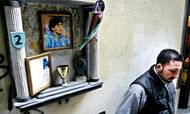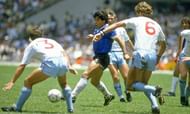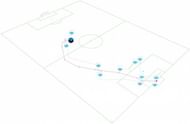“Maradona has the ball, two mark him, he touches the ball. The genius of world football dashes to the right and leaves the third and is going to pass to Burruchaga. It’s still Maradona! Genius! Genius! Genius! Ta-ta-ta-ta-ta-ta-ta. Gooooooooooal! Gooooooooooal! I want to cry! Dear God! Long live football! Gooooooooooal! Diegoal! Maradona! It’s enough to make you cry, forgive me. Maradona, in an unforgettable run, in the play of all time.
“Cosmic kite! What planet are you from? Leaving in your wake so many Englishmen, so that the whole country is a clenched fist shouting for Argentina? Argentina 2, England 0. Diegoal, Diegoal, Diego Armando Maradona. Thank you, God, for football, for Maradona, for these tears, for this, Argentina 2, England 0.” - Victor Hugo Morales, June 22nd, 1986
The Preamble
It’s the quarterfinals of the World Cup, Argentina and England have just kicked off the second half of their tense quarterfinal clash. Six minutes on, the little Argentinian captain, Diego Armando Maradona, decides to do something about the goalless scoreline.
Picking a pass from Julio Olarticoechea, he cut in from the left – moving past Glenn Hoddle like he wasn’t even there – and sashays past the hapless Peter Reid and Terry Fenwick, before flicking a pass to Jorge Valdano on the right (after having drawn both Terry Butcher and Kenny Samson toward him). It’s an astonishing burst of skill from the little man.
Valdano, on getting the ball, tries to turn Steve Hodge but is intercepted by the Englishman. Attempting to hoick the ball away, Hodge slices it right back up and toward his own goal where the great Peter Shilton ambles toward it.
Maradona, who hadn’t stopped running after laying the ball off, sees his big chance – the fact that he had the sheer audacity to leap for the ball against a keeper who was a foot taller than him is revealing in itself – and mid-leap raises his left fist slightly over his head...
Wait. Wait. Wait.
We all know what happened next.
“The Hand of God”. Of course Maradona had actually said that the goal was created “a little with Maradona’s head, a little with the hand of God”, but that’s not the point here. To this day, we remember that day, that match, indeed that entire World Cup for that one undoubtedly controversial moment.
We should not be doing that.
The Cosmic Kite takes flight
For, just four minutes after that act of complete madness came a piece of magic that has seen very few parallels in the history of the game, with only Lionel Messi coming even remotely close to doing something similar.
Receiving the ball just off the comical giant spider shadow that lay over the centre circle of the Azteca, Maradona dismisses the attentions of Peter Reid and Peter Beardsley with the daintiest of pirouettes. He runs up the right wing, picking up speed as he goes – the ball wobbling around as if it had a mind of its own
(This is one of the great illusions that Maradona was capable of, many-a-times it seemed like he had lost control of the ball – kicked it a bit too far maybe, or kept ahold of it for a bit too long – while in reality, the ball was a yo-yo; always in control; attached to his feet with strings that were but invisible to the rest of us).
Soon he makes Terry Butcher look like a lost schoolchild desperately searching for a lost candy bar, and the squat little man is now going faster than anyone else on the pitch.
He slips past the bewildered Fenwick with contemptuous ease, teases Shilton off his line before rounding him and holds off Butcher again (who, to his credit, hadn’t given up the ghost and had come back for more) before slipping the ball into the now empty net.
The ball went from the middle of the pitch to the end of it in under 11 seconds - not once did it go out of control and not once did it touch anything but the left foot of Diego Maradona. Barry Davies, commentating for BBC – yelled “You have to say that’s magnificent! Pure football genius!”.
The Uruguayan Victor Hugo Morales, the voice of Argentinian radio, produced that minute-long paean to football and the genius of Maradona, the endearingly chaotic mix of emotion and poetry that started with him calling El Diego a “cosmic kite” and ended in a cry of heartrending passion that needed no translation. Maradona had done something absolutely out of this world (Morales was quite right to question his planet of origin).
He had taken on half the opposition team all by himself, in the most important of knockout games, in the Cup that mattered the most – and he had beaten them all. It’s the kind of thing that defines a person, the kind of thing that happens only once in a lifetime.
So, four days later, in the semifinal against Belgium, he did it again.
The Left Foot that inspired the world
Maradona made a habit of doing the impossible during his colourful career. If there was something someone said he couldn’t do, he would do it anyway. If there was something he someone said he shouldn’t do, he would do it just for the heck of it.
You could kick him and he would get right the hell back up – like a ball bouncing higher the harder you hit it. You could try and stop him and he would inevitably end up making you look stupid. He could outsmart you and outfight you. All that bravery, intelligence, imagination and pure, unadulterated, skill in one person? – it was almost unfair.
It was also a helluva lot of fun to watch.
In the final of that magnificent tournament in ‘86, Germany thought they had had the better of him – a young Lothar Matthaus doing a number on Maradona that day – only to be picked apart in the last minute by arguably the greatest assist ever seen at such a grand stage. Jorge Burruchaga’s finish was exceptional, but the pass from Maradona had well and truly created it – another moment of “pure football genius” .
Never before – and never since – has the World Cup been bent to the will and skill of one man in such a complete manner; when Argentina needed him most, he had hoisted them onto his shoulders and carried them all the way.
He had gotten the world singing “AR-GEN-TINA”, “AR-GEN-TINA” – from the townships of Buenos Aires to the streets of Naples, from the cafés of Kolkata to the “chaayakadakkall” (tea-shops) of Tanur – he had turned the entire planet into one screaming congregation that sang for Argentina and worshipped its captain. He was their inspiration - the working-class lad who had taken on the world, and beat it.
He was their hero.
And it had all started that day – on June the 22nd, 1986 – with eleven touches from the “Left Foot of God”

Post Script
Yes, he cheated, but in that game he was more cheated against than the other way around; the little man had been treated as he always was on a football field – being kicked around like a rag doll (Terry Fenwick nearly took him out in the ninth minute, crumpled an elbow in his face just before the break and whacked his head again for good measure just after the restart) and he had not once complained.
Not to justify his quite deliberate handball but for anyone who says a handball is worse than an elbow to the face or an ankle threatening tackle – the corner for sanctimonious pseudo-intellectual snobs is that-a-way. Thank you.


